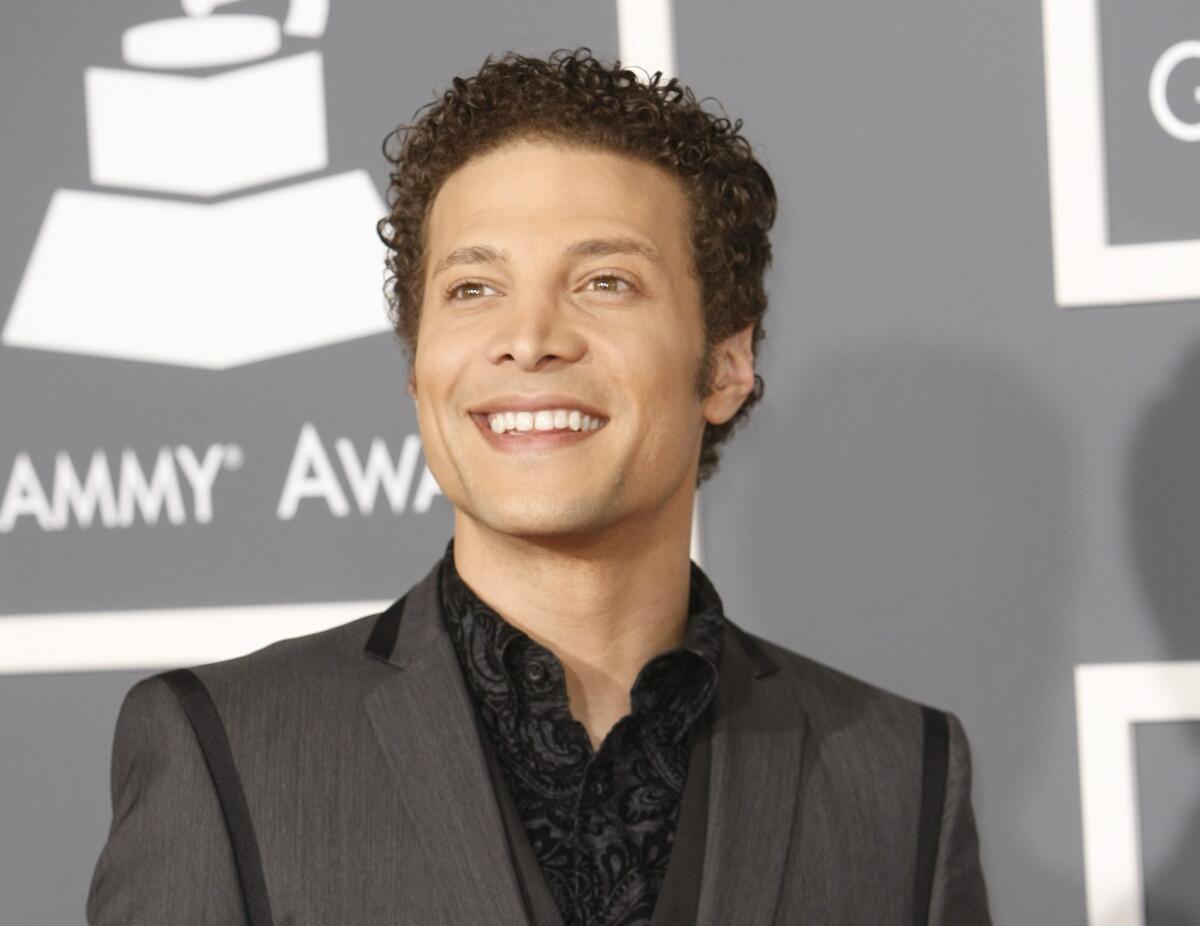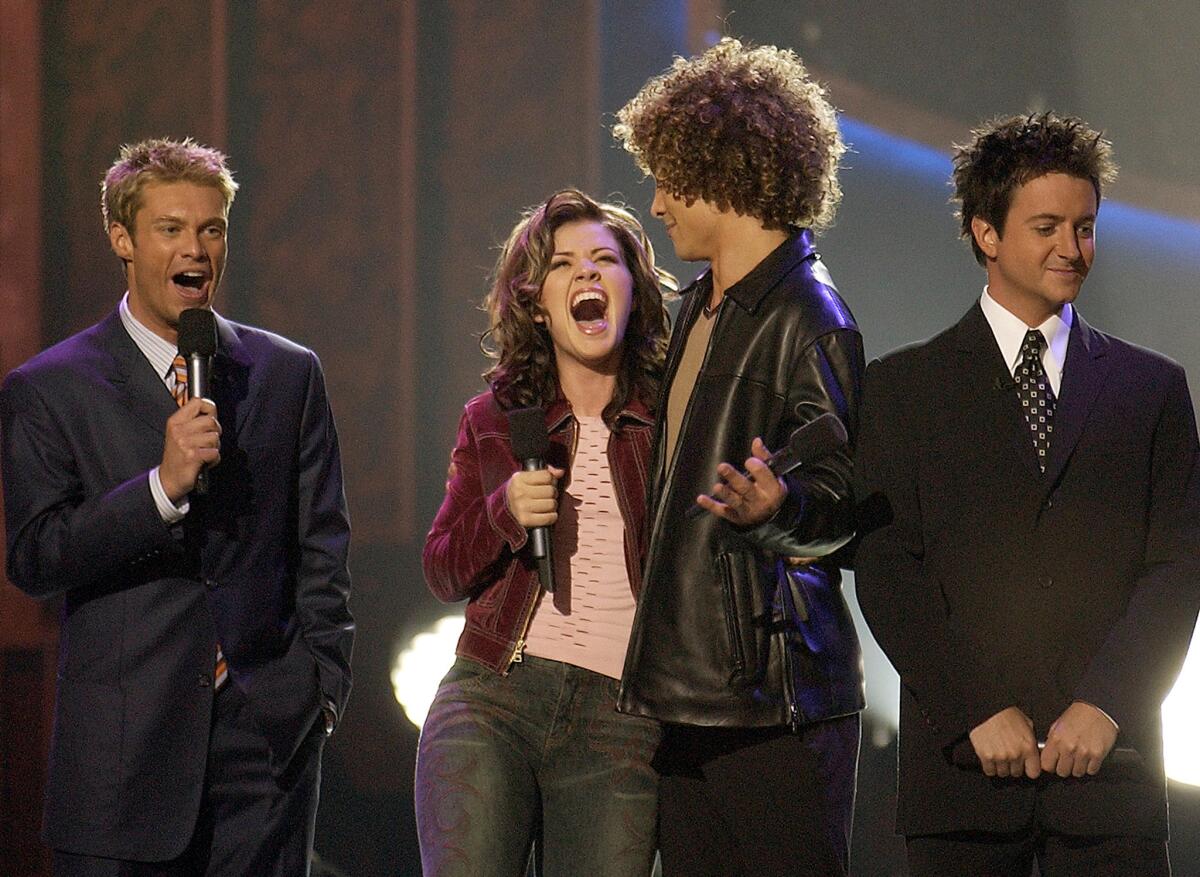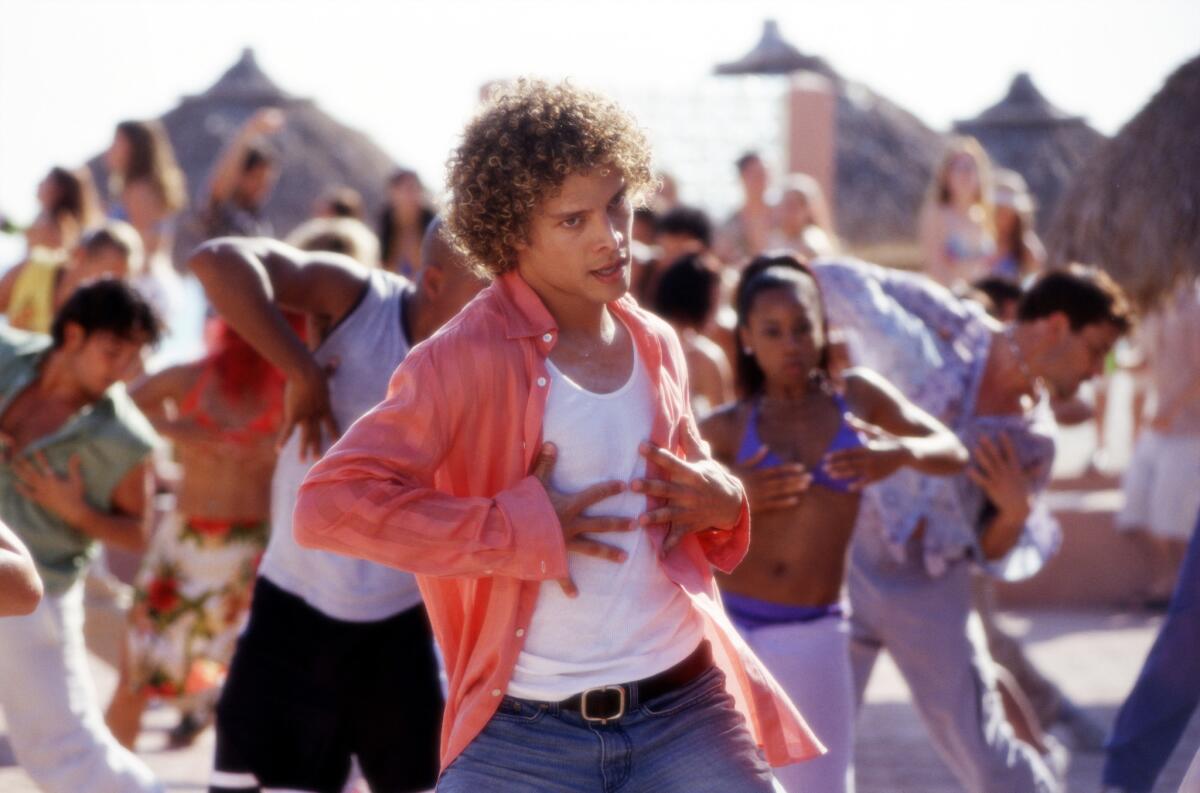Essay: Justin Guarini looks back on his ‘American Idol’ experience

Justin Guarini attends the 2011 Grammy Awards in Los Angeles.
Ahead of “American Idol's” series finale tonight, we asked Justin Guarini, the runner-up of the show's inaugural season in 2002, to recount his time on the show -- and his career after he placed second behind Kelly Clarkson. This is his story as told to Los Angeles Times staff writer Gerrick D. Kennedy.
Iremember my mom saw a commercial for a singing competition on TV and told me, “Hey, you should check this out.” And so I did. I went to the website and this was at a time before the Internet was this ubiquitous thing. The website itself was pretty advanced graphically for the time, but certain links didn’t work -- it was obviously put up quickly and with a minimal budget. I downloaded the contract and signed my life away.
COMPLETE COVERAGE: Saying farewell to the competition show that changed television
A few weeks later I found myself in New York, right in Times Square, reading “Harry Potter and the Sorcerer's Stone” (that tells you how long ago that was). There were so many people. I remember being so annoyed because people were singing so loudly -- and hard -- in the line. I’m thinking, “Do these people know that they have an audition?” They were just yelling and singing as if the judges were just on the street and were going to walk up and discover them.
We waited for hours on end in a holding room in the Millennium Hotel -- it was a actually just a conference room. There wasn’t any food or snacks or anything, we just waited for forever. We went down to another room where we were interviewed, and that took forever. And then we went into another room where we were lined up five at a time -- you stepped forward and you sang a verse and a chorus and you stepped back -- and then we were ushered out and waited hours to find out who would be called back the next day. I waited and waited and waited. It was like every movie you’ve ever seen where people are patiently waiting around the cork board for someone to tack up the paper that tells you who made the cut. And I made the cut.
I went back home to Philly and came back the next day and again waited hours. I saw these two guys in front of a video camera talking to people -- one had this jet black hair, the other had brown hair with frosted tips and it ended up being Brian Dunkleman and Ryan Seacrest.

Ryan Seacrest, from left, Kelly Clarkson, Justin Guarini and Brian Dunkleman are shown during the finale of the inaugural season of “American Idol” on Sept. 4, 2002.
Ryan Seacrest, from left, Kelly Clarkson, Justin Guarini and Brian Dunkleman are shown during the finale of the inaugural season of "American Idol" on Sept. 4, 2002. (Ray Mickshaw / Fox)
I remember going to a room in front of who I later found out was Ken Warwick and an assistant and I sang a verse and a chorus. And I’ll never forget, the assistant or whoever it was leaned over to Ken and whispered. I thought, oh my God, well that’s it, I’m going home, I’m done. Kenny looked at me -- he’s got the most piercing blue eyes I’ve ever seen -- and said “Yeah, you’re good, you’re going through.” I thought I was going home, but I didn’t know what I was going on to until I got upstairs and sat in a holding room.
There had been rumors filtering down that Paula Abdul was there and there was this guy there who was unbelievably mean. I was nervous. I’m used to going in and auditioning for people who would just say “Great job.” I’ve never had to sit there and be so acutely adjudicated. I didn’t know if the rumors were true because nobody was telling us anything. I’m sitting in the penultimate holding room and out walks this little beautiful woman. I remember we crossed paths on the way to the bathroom and it was that super awkward moment of me trying to be a gentleman letting her go to the bathroom first and she very politely told me to go first.
Walking into the judge's room, it was such a dramatic moment. You had to walk through this massive sliding door as if you were walking through some medieval dungeon. I walk in and I saw the three judges. Paula was the only one that I knew. There was Nigel Lythgoe and a bunch of suits and people behind monitors. I focused on Paula, the one anchor I had in a sea of unknown faces, and I sang. And I was very fortunate to be well-received.
I had never been to California before. It was just so beautiful. When we landed in Los Angeles, they took us to Pasadena. Between LAX and Pasadena there were so many sights to see. Of course you want to see the Hollywood sign. I was just dying. I was fascinated by the weather. I was fascinated by the culture. The fact that they had crosswalks where you could cross diagonally, that was something I had never seen before.
I was 22 years old and completely green, yet I still understood the significance of the fact that when I was in Hollywood Week, I was dancing and singing on the same stage that Michael Jackson had done the moonwalk on. Those amazing things didn’t escape me because I grew up with that, but I was still this green kid just trying to keep his composure throughout a pretty harrowing process. Hollywood Week really weeds out the people who cannot keep up with the pace. It purposely puts you through the ringer, and Nigel told us that. They told us it was going to be difficult, that they were going to put us through the paces and that we were going to struggle. There’s no malice behind it. They knew what it was going to take to be able to handle the pace of “Idol.”
They kept us protected from the public. They kept us protected from the press. There was an innocence and a family atmosphere. We were able to interact with the judges in a way that you just can’t do anymore -- I mean hanging around them and talking, nobody knew what this thing was, so there was just an ease about everything, although it was very serious.
You never really saw much of us in our downtime because they were protecting us so much, in the best ways, from being overwhelmed. They took such great care of us. There was a big mansion up off Mulholland Drive. It was absolutely beautiful, but it was meant to be used for video shoots and photo shoots. My shower only had one pane of glass so I had to very strategically place the glass so that the water would bounce off my body so that when I stepped out, I didn’t break my neck.
That first week they started cutting folks and it got real, right away. It got real for everyone in that house when we saw EJay [Day] and Jim [Verraros] get into the town car and be driven out of the complex. I just remember EJay saying, “I can’t believe this is over,” and getting in the car. That’s when I realized, oh, man, that could be me. We took really great care of each other. Everyone got along so well.
It didn’t start to get crazy for me until I found myself in the bottom two. That was when things got intense. That whole week really. I was the first person to ever talk back to Simon [Cowell] and I think that got me in the bottom two. Things smoothed out until it was Kelly and I having to cover all the press, fly back to our hometowns and fly to New York.
That last moment felt exactly the way you saw it. I was relieved. I was overjoyed. I couldn’t have been happier for her because it was so evident that she was the one. I think it would have been a mistake if I was crowned because it just would not have spoken to the journey or had the same impact that Kelly’s victory did and the journey that she took. She was never in the bottom three, she peaked at the exact right moment and she was obviously extremely talented. I was overjoyed.
After we finished “Idol,” we went out on tour and then we started rehearsing for “From Justin to Kelly.”

Justin Guarini appears in a scene from the film “From Justin to Kelly.”
Justin Guarini appears in a scene from the film "From Justin to Kelly." The musical romantic comedy was widely panned. (John Adams / Los Angeles Times)
When we were approached about the movie, we were game. We read the script and thought it was interesting. It was like “Why not?” I feel like it was a wonderful opportunity. Both of us had acted in high school but never at the sort of level required for a feature film. We did the best we could with it. It was fun. People come up to me now and tell me that they loved it as a kid and I watched it with my family. To me it was a continuation of one of the greatest things about “American Idol,” which is it’s a great equalizer in terms of entertainment for the masses. There’s not a lot of things you can sit and watch with your entire family.
Recording my first album, I was able to work with so many wonderful artists. Kenny “Babyface” Edmonds. Harvey Mason Jr. Just really fantastic producers and writers. But it was a challenge.
The record itself was out of my control. And at the same token, I didn’t know what I wanted to do anyway. There was no real throughline of the album and I think that was evident in how it was handled and how it was received. It was an opportunity missed. I think there was such great expectation from the show that built up so much hype. It’s a hallmark of the entertainment industry that you get built up and if you don’t maintain a high, high level of quality of product, the next inevitable step is to be torn down by the same industry that built you up. Things started to take a turn with the film and the reception of the album and it became negative to the point where I was just baffled. I said, "You know what? I’m done," and I left the country for two weeks and I took a step back. I didn’t show up publicly to any events and kept to myself. I very slowly came back and did some dates and appearances and [kept a] low profile.
And then the split with the label. Literally I didn’t find out until I was watching “Saturday Night Live” and Tina Fey said it during “Weekend Update.” No one told me. It was heartbreaking. I walked away from the industry after that and stayed away for about a year or so, but my love of music brought me back. The fanbase that I had was extremely passionate. I was really encouraged to not give in to the age-old story of being beat down by the media and by the nameless, faceless “they.”
Slowly, but surely, I came back.
I did shows and sang the songs people liked from the album and made appearances and eventually found my way to hosting and television. I hosted red carpets for the Grammys, Oscars, Emmys and continued to build on that success.
I put out a jazz album [2005’s “Stranger Things Have Happened”] because big band night was one of my favorite night’s on “Idol.” From there I continued on to Broadway, where I’ve been doing shows for the last five or six years.
I’ve seen the highs. I’ve seen the lows. I’m somewhere in the upper middle but I’ll never be ashamed of being a part of “American Idol.” I’ll never be ashamed of everything I did on “American Idol” or after because it makes me who I am. I had the great fortune of being able to be on the face of every magazine, newspaper and have this huge exposure and then I was able to go and have a private life on my own terms and then get back into the business the way I’ve wanted to.
This show was at the infancy of reality television as we know it today. And it has been, and will always have been, about talent -- which is not something you can say about 99.99% of reality shows. That will be the show’s legacy. As will its profound impact on the entertainment industry. It’s spawned Grammy winners, an Oscar winner, people in television, radio, film, Broadway, all across the spectrum of entertainment -- “Idol” has completely influenced, for the better, the entire landscape.
Justin Guarini is working on a music project and currently stars as Lil' Sweet in Diet Dr Pepper commercials. He lives in Philadelphia with his wife and two children.
For more music news, follow me on Twitter: @gerrickkennedy
MORE
'American Idol' was a game-changer in television and beyond
'American Idol' became a big star, but now it has been voted off
The biggest entertainment stories
Get our big stories about Hollywood, film, television, music, arts, culture and more right in your inbox as soon as they publish.
You may occasionally receive promotional content from the Los Angeles Times.








